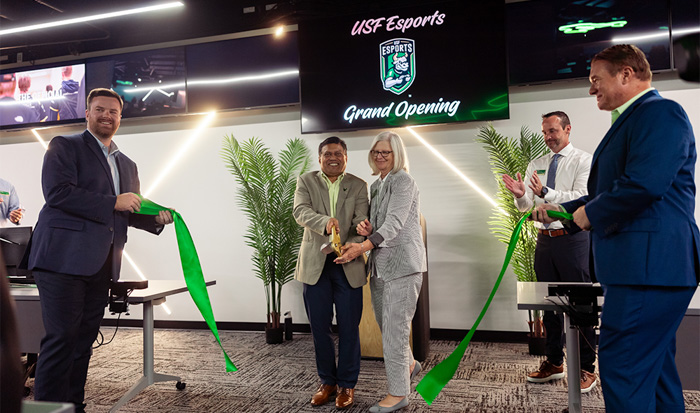TAMPA — Andrew Ross didn’t expect his love for video games to turn into a career. But today, he’s the first full-time esports coordinator at the University of South Florida, helping students connect through gaming.
LISTEN TO HIS STORY BELOW:
Ross began his USF journey in 2019 as a graduate student in the Vinik Sport Entertainment Management program at the Muma College of Business. In 2020, while the pandemic disrupted campus life, USF’s esports program was just beginning. Knowing Ross had an interest in gaming, his program director connected him with Antonio Gonzalez, who was launching the initiative under Recreational Wellness.
“I became an intern,” Ross explains. “I began working with the program as we were just getting started. So we created our first Discord server, we were doing basic FIFA tournaments and things like that. None of the clubs existed, we didn’t have a space—it was completely just a concept.”
“My second year of graduate school, I became a graduate assistant,” Ross recalled. “Once I graduated from my program in 2021, they then hired me on as the first full-time esports coordinator for the university.”
Ross’s love for video games started at home.
“I just played games for fun. I got my first Xbox- my parents got me one for Christmas when I was, like, 14. Before that, I was playing Nintendo DS and GameCube at my grandma’s house,” he said. “I didn’t come from a competitive background… I never played for a team.”
Ross believes that the program is special.
“Traditionally, most of our club officers for our esport clubs, this is the first leadership position that they’ve had on campus,” he said. “And for a lot of our members, this is the first extracurricular activity that they’ve been involved with because up until now they maybe haven’t really found their niche.”
To help newcomers understand esports, Ross often compares games like Rocket League to traditional sports.
“How I describe it to people is it’s soccer, but you drive a car. And you drive the car into the ball and you try to put the ball into the back of the net,” he explained. “It takes communication, it takes leadership, it takes tenacity to be able to work together to complete the objective.”
The equipment is different, but the outcomes are the same: developing friendships, improving leadership, and competing together.

